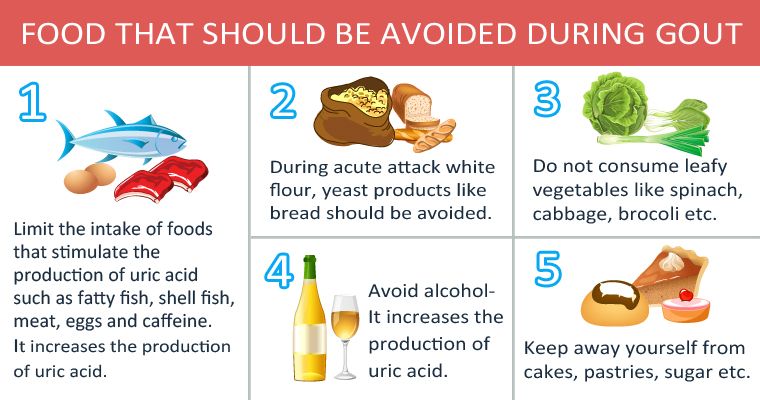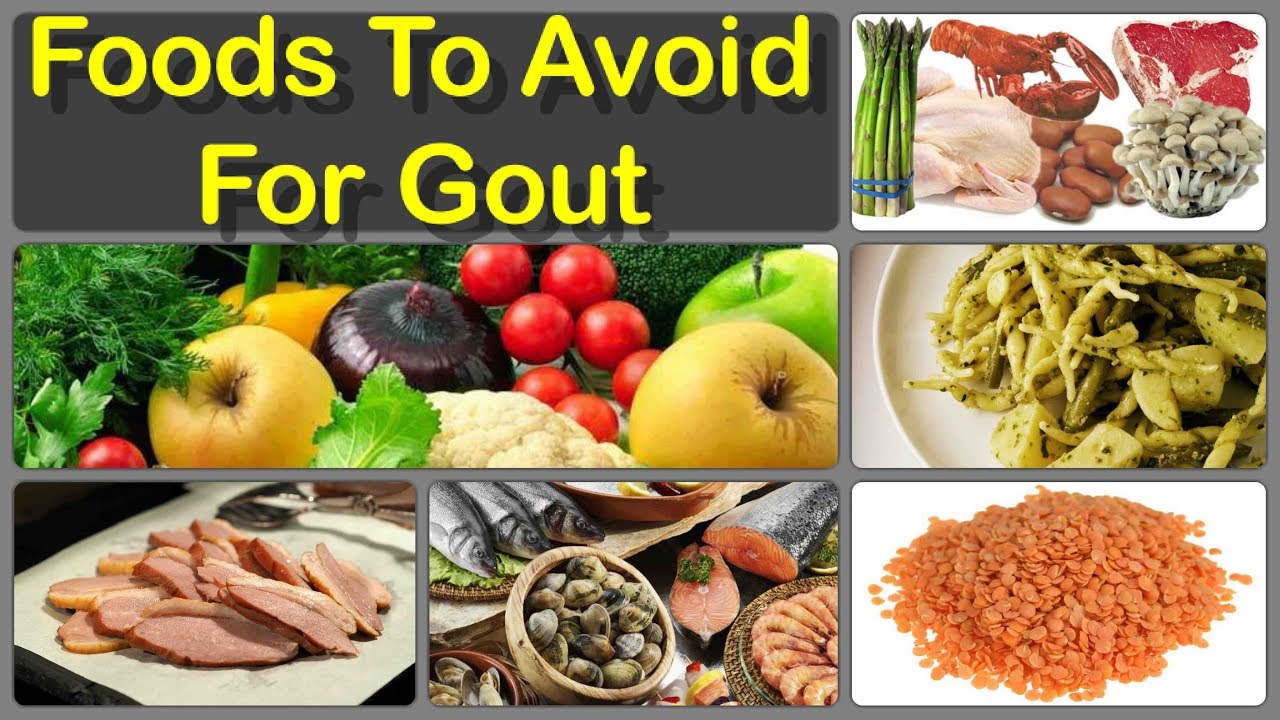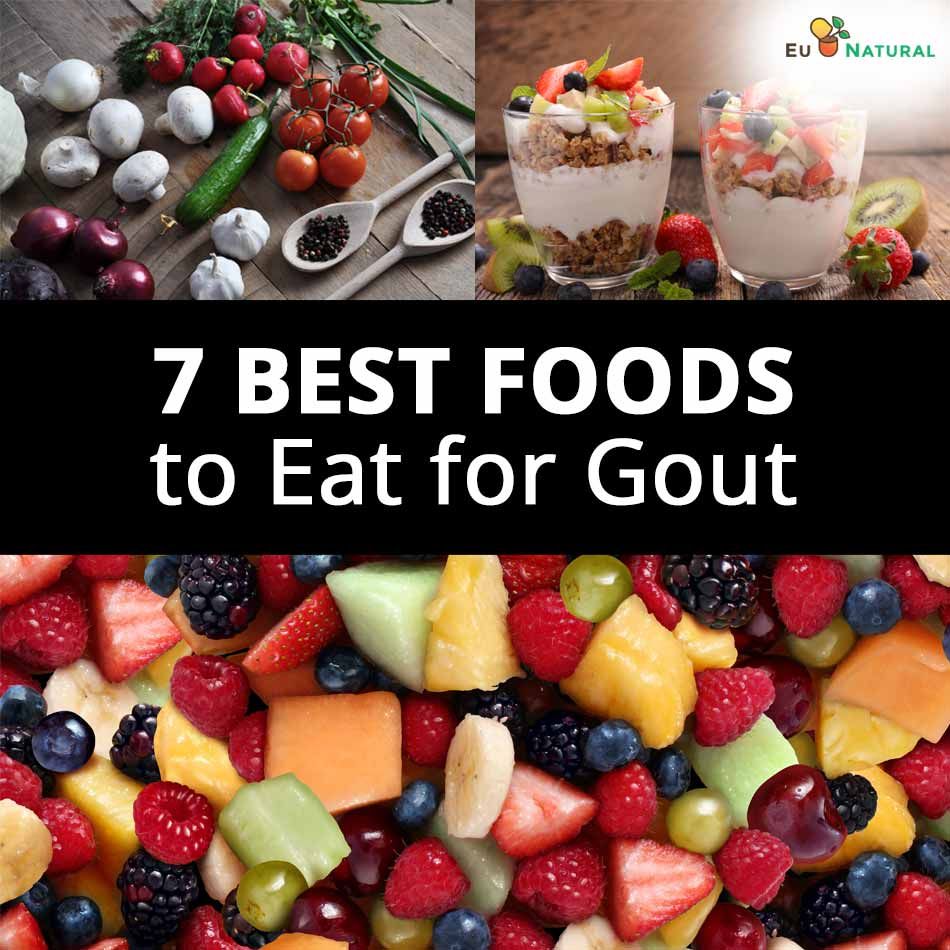Instead Of Beer Try Other Alcohol In Moderation
All alcohol is high in purine, but drinking beer is especially risky if you have gout because it contains both purine and yeast, which can cause uric acid levels in the blood to rise. The dehydrating effect of alcohol also makes gout worse. If you want to enjoy an alcoholic beverage, try sipping on a glass of wine or a wine cooler. Drink plenty of water when drinking alcohol to avoid dehydration.
Low Purine Diet : Foods To Eat Vs Avoid
Painful conditions like gout and kidney stones affect millions of people around the world. Fortunately, both can be well-controlled simply by making a few modifications to your daily routine and following a low-purine diet.
Not only can limiting your intake of purines aid in the prevention of these serious conditions, but it can also boost your intake of important nutrients by prioritizing healthy whole foods like fruits and vegetables. Plus, its easy to follow and effective, making it simple to manage symptoms and prevent flare-ups.
Heres what you need to know about a low-purine diet, including how to follow it and how it can benefit your health.
Gout Diet: 7 Foods To Eat 7 Foods To Avoid
Why do certain foods cause painful gout symptoms? Our bodies produce uric acid as it digests some types of foods and excess uric acid can accumulate in our joints as crystals. Healthy individuals can usually filter out much of the extra uric acid however, for those who have underlying health conditions or elderly adults whose body processes have slowed down, uric acid builds up.
Recommended Reading: What To Do If I Have Gout
What Food To Eat
Now that you know what foods to avoid, how do you know what foods are safe to eat? Your gout diet should include plenty of the foods on this list as they produce no or very little uric acid when digested.
- Fruits and vegetables: all fruits and vegetables are fine and cherries could even help prevent attacks of gout as it lowers uric acid levels
- Whole grains: oats, barley, brown rice, others
- Dairy: low-fat dairy products provide many benefits as part of a gout diet
- Legumes: beans and lentils are great proteins as are soybeans and tofu
- Nuts: nuts and seeds like almonds and sunflower seeds
- Drinks: coffee and tea
- Oils: when cooking, stick to plant-based oils like olive oil or canola oil
List Of Foods Not To Eat When Battling Gout

Related Articles
Gout is a form of arthritis that results in painful crystals of uric acid forming in one or more joints. In many cases, gout is associated with overconsumption of certain foods including alcohol, meats and seafood. Gout can be effectively treated with a combination of medications and dietary guidelines limiting foods that produce high levels of uric acid.
Recommended Reading: How To Treat Gout Flare Up
Which Foods Should You Avoid When You Have Gout
Purines are compounds that are found in specific food and drink and they change to uric acid in the body. Most meat and seafood are high in purine and can increase uric acid levels in the body. These therefore should be limited during episodes of a gout attack and portion size should be reduced. Common examples of foods high in purine include anchovies, sardines, offal foods such as liver, kidney, sweetbreads, game, goose, minced meat, mussels, partridge, roe, scallops, herring, gravies, stock cubes and meat and yeast extracts.
Why Do People Get Gout
Gout is a type of arthritis causing pain and swelling in the joints. The symptoms usually occur as flares lasting for a week or two and then go away. Gout flares usually start in the big toe or a lower limb.
The disease happens when the body has high levels of a substance called uric acid or urate. When high levels of uric acid build up, the needle-shaped urate crystals form in and around the joints. This causes inflammation and arthritis of the affected joint. Many people with high serum uric acid, however, may not develop gout.
Some factors may increase a persons risk for gout, including
- Male gender
Gout is a lifelong disease and cannot be cured. The disease, however, is one of the most controllable forms of arthritis. It can be effectively managed with early diagnosis, medications and lifestyle changes.
Read Also: What Can You Take To Get Rid Of Gout
Instead Of Gravies And Sauces Use Vegetable Broth Or Dairy
Since they are made with the fat and drippings from meat and poultry, gravies and sauces made from beef, pork, and poultry should be avoided because they contain high amounts of purine. Try making sauces with vegetable broth or tomato sauce. Dairy-based sauces, such as a low-fat cream sauce, are also safe alternatives.
Sodas And Sugary Drinks
Sodas and sugary drinks are considered empty-calorie foods, because they contain no beneficial nutrients while contributing a lot of calories to your diet.
For example, a 12-ounce can of cola contains about 150 calories and 40 grams, or about 9.5 teaspoons, of added sugars. In addition, sugar-sweetened beverages have been associated with an increased risk of heart disease, type 2 diabetes, weight gain, and dental caries.
Recommended Reading: Is Elderberry Good For Gout
What Foods Are Good For Gout
Dietary management of gout focuses on reducing the amount of uric acid in the system and attaining and maintaining a healthy body weight.
Foods that may help keep gout in check are
- Fresh fruits and vegetables such as berries, oranges, bell pepper and pineapple
- Low-fat dairy products, such as yogurt and skimmed milk
- Nuts including nut butters such as almond butter and peanut butter
- Whole grains
- Potatoes, rice, whole-grain bread and pasta
- Eggs
- Oils such as olive oil
- Flax and other seeds
Alcohol Is The Biggest Risk Factor For Gout
It is well-established that frequent alcohol intake dramatically increases risk of gout .
The Framingham Heart Study of over 4,500 participants provides some perspective.
Researchers found that regular alcohol use was associated with three times greater risk of gout in women compared to those who have less than 2 standard drinks per week. For men, regular drinkers had double the risk of non-drinkers .
Beer seems to be the worst, followed by hard liquors such as spirits. Interestingly, moderate wine consumption is not linked with any risk .
The reason why alcohol increases uric acid levels is still not well-understood. Some forms, particularly beer, can be high in purines but they are certainly not the richest source of purines in our diet.
Additional theories propose that excessive alcohol may also reduce the bodys ability to excrete uric acid. Others state that alcohol especially beer increases the chemical breakdown of purine-containing ATP nucleotides, which is a precursor of uric acid production .
Summary: Regular alcohol intake severely raises uric acid levels in the blood. It doubles, if not triples your risk of gout.
Don’t Miss: How To Get Rid Of Gout In Toes
Vegetables Like Beetroot And Gout
Most vegetables fall into the low-purine category, so vegetables are not usually on the list of foods to avoid with gout. However, there are a few vegetables containing a moderate amount of purines that people with gout should be aware of.
According to the American Academy of Family Physicians, moderate-purine vegetables include:
- Asparagus
- Cauliflower
- Mushrooms
Simply because these vegetables contain moderate amounts of purines does not mean that people with gout should avoid them altogether. According to Mayo Clinic, the purines in vegetables do not increase the risk of gout or recurring gout attacks.
Similar to purines, oxalates are another type of natural substance that increases the uric acid content in the body. Vegetable sources of oxalates include rhubarb, turnips, beets and okra. This is why there is speculation of a negative association between beetroot and gout. Since beets contain oxalates, beetroot and gout may not not be a good combination. The same is true of okra. Though it has many health benefits, it is not true that okra is good for gout.
If you have gout, you may choose to consume or avoid vegetables that contain purines and oxalates.
Read more:List of Foods That Raise Uric Acid
Ten Tips For Beating Gout

If you have gout, use these nutrition tips to lower your risk:
See your GP to check or monitor gout risk factors
Drink up to four cups of regular or decaffeinated coffee a day
Have two to three serves of reduced-fat or skim dairy foods daily
Eat cherries regularly . Add to breakfast cereal and snacks, or mix with yoghurt
Avoid fasting and feasting. Both increase purine turnover and blood uric acid
You May Like: Drinking Epsom Salt For Gout
What Is A Low
A low-purine diet involves reducing your intake of certain foods to decrease the purine metabolism pathways, which are responsible for converting purines into uric acid.
Healthy whole foods like fruits, veggies, nuts, seeds and legumes are all encouraged as part of the diet while ingredients like red meat, seafood, wild game and organ meats should be consumed only in moderation.
Foods high in fructose, which is a type of simple sugar, should also be limited. Fructose is broken down into purine, which can increase levels of uric acid in the body. Although fructose is found naturally in fruits, these foods are also high in fiber, vitamins and minerals that can offset any negative effects.
Conversely, soft drinks, fruit juice and processed foods all typically contain a concentrated amount of fructose and should be limited on a low-purine diet.
Low-purine diets are recommended for those with gout or certain types of kidney stones to prevent flare-ups and minimize symptoms. A low-purine diet for dogs is also sometimes recommended to prevent uric acid kidney stones from forming in certain breeds who may be more susceptible.
Instead Of Meat Try Vegetable Sources Of Protein Or Dairy Products
All meat, including beef, poultry, and pork, contains purine. Most experts recommend controlling purine intake by consuming no more than six ounces of meat each day if you have gout. If you crave more protein in your diet, try adding nuts and nut butters, soy, or beans to your diet. Low-fat dairy products such as milk, cheese, and yogurt are also great sources of protein that are low in purine.
Also Check: Can Eating Too Many Tomatoes Cause Gout
Starting A Gout Diet Foods To Eat And Those To Avoid
Some foods can trigger a gout attack by increasing uric acid levels. The foods that trigger it are commonly rich in purines. When you digest it, your body produces uric acid as a waste product. This is not a problem for healthy people, as they effectively remove excess uric acid from the body. However, people suffering from this inflammatory disease cannot effectively remove it. Therefore, a diet high in purines, can allow uric acid to build up and cause gout, but limiting its intake can prevent it.
Foods that commonly trigger gout attacks include organ meats, red meats, seafood, alcohol and beer. However, there is an exception to this rule: research shows that vegetables high in purines, do not trigger gout. Interestingly, sugary drinks, with fructose and sugar, may increase the risk of gout attacks, even though they are not rich in purines. On the other hand, low-fat dairy products, soy products, and vitamin C supplements can help prevent gout attacks by reducing uric acid levels in the blood. Fatty and high-fat dairy products do not seem to affect uric acid levels.
What foods should I avoid?
All meats that come from organs: liver, kidneys, sweetbreads and brains.
Game meats: for example, veal and venison.
Fish: herring, trout, mackerel, tuna, sardines, anchovies, haddock.
Sugary drinks: especially fruit juices and sugary drinks.
Added sugars: honey, agave nectar and high fructose corn syrup.
Yeasts: nutritional yeast, brewers yeast and other yeast supplements.
Gout Diet: What’s Allowed What’s Not
Medically reviewed by Drugs.com. Last updated on Jul 2, 2020.
Gout is a painful form of arthritis that occurs when high levels of uric acid in the blood cause crystals to form and accumulate in and around a joint.
Uric acid is produced when the body breaks down a chemical called purine. Purine occurs naturally in your body, but it’s also found in certain foods. Uric acid is eliminated from the body in urine.
A gout diet may help decrease uric acid levels in the blood. A gout diet isn’t a cure. But it may lower the risk of recurring gout attacks and slow the progression of joint damage.
People with gout who follow a gout diet generally still need medication to manage pain and to lower levels of uric acid.
Also Check: Will Gout Go Away Without Medication
Tired Of Regular Gout Flare
If so Ive got some goods news
The cause of gout is simply too much uric acid build up in your joints. Before you rush to the doctor, you can take steps to fight back against too much uric acid – the safe and natural way!
Nutritionist Evan Burns, reveals how in his FREE report, with a dozen ways to fight excess uric acid — without prescriptions or steroids!
Which Foods Are Safe For Gout
Find out which foods to eat and which to avoid if you have gout.
Question: I havegout. Can you tell me which fruits, vegetables, meats or seafoods I should eat or avoid? Is there any type of alcohol wine, beer, spirits that is better or worse for me than others?
Answer: Dietary management of gout is very restrictive and doesnt always work to control gout, so a combination of medication and diet may be the best way to treat your gout. In addition to medications that treat the inflammation and other symptoms that occur during a gout attack, medications exist that can treat the underlying metabolic condition of hyperuricemia too much uric acid in the blood.Hyperuricemia can occur either when the body produces too much uric acid or when the body does not excrete enough uric acid. Drugs exist to treat both causes.
Purine compounds, whether produced in the body or from eating high-purine foods, can raise uric acid levels. Excess uric acid can produce uric acid crystals, which then build up in soft tissues and joints, causing the painful symptoms of gout. Dietary management focuses on reducing the amount of uric acid in the system and attaining and maintaining a healthy bodyweight.
The primary dietary modification traditionally recommended is a low-purine diet. Avoiding purines completely is impossible, but strive to limit them. You can learn by trial and error what your personal limit is and which foods cause you problems.
High-Purine Foods Include:
Nutrition
Don’t Miss: What Foods Can Cause Gout Flare Ups
Avoid Sweets And Sodas
Unlike fruit with its natural sugar, artificial sugars are widely recognized as gout flare dangers. Consuming too many sugary sodas has been found to provoke attacks, but no association has been found with artificially sweetened sodas. Other foods loaded with high-fructose corn syrup can also bring on gout pain.
Foods And Drinks That May Be Good For Gout

Water
Drinking plenty of water and staying hydrated is important if you have gout. Aim to drink at least eight 8-ounce glasses of water each day. Drinking water can help keep uric acid from building up and help release it from your body. If you have fluid restrictions because of kidney disease, talk to your doctor or dietitian about managing your fluid and gout
Cherries and foods with vitamin C
Some foods like cherries and fruits and vegetables high in vitamin C have been shown to lower the level of uric acid in your blood, which can have a positive effect on gout. Some examples of foods high in vitamin C are:
- Oranges
Don’t Miss: Are Lentils Good For Gout
Be Choosy About Carbs
Carbs can be helpful or harmful to your gout health. The most helpful carbs are found in whole grains, fruits, vegetables, and legumes. Sweet potatoes, beans, apples, and popcorn can all be served in wholesome and delicious ways as part of a healthy gout diet.
Other carbs come as natural and refined sugars. Candy, sports drinks, some breakfast cereal, and some pasta sauces all contribute to dietary sugar from unhealthy carbs.
Weight Management And Exercise
The Arthritis Foundation emphasize how important it is for people with gout to manage their weight.
Obesity is a risk factor for developing gout. If a person with gout has excess weight, losing a few pounds can help them:
- reduce pressure on painful joints
- lower the risk of heart disease
- build up strength and flexibility
- To achieve this, the person should ask their doctor about:
- a suitable diet to help them manage their weight
- an exercise plan
Anyone who smokes should also ask their doctor to help them with a plan to quit.
The Mediterranean diet contains plants, grains, and healthful fats. It may help people manage their weight while eating healthfully.
Recommended Reading: Is Banana Good For Gout
Foods And Drinks To Avoid When You Have Gout
Alcohol is a trigger for gout attacks. When you drink, your kidneys work to filter out alcohol instead of uric acid, leaving uric acid to build up in your body. Beer is especially bad for gout because it has purines.Sugary drinks , sugary foods, and foods with high fructose corn syrup should be limited because of their connection to gout. There is less evidence about why these foods and drinks increase the risk of gout, but some connection has been found. Foods that are high in purines should be completely avoided since they contribute to creating uric acid in your body. These include:
- Anchovies
- Animal organs
- Dried beans and peas
Content courtesy of the National Institutes of Health :